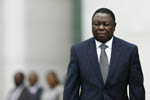
Zimbabwean Prime Minister Morgan Tsvangirai recently wrapped up a three-week fundraising tour, during which he touted the successes of the unity government in an effort to drum up support from the United States and Europe. At the same time, Amnesty International’s Secretary General Irene Khan toured Zimbabwe, exposing the continued "woefully slow" progress by the unity government to improve the horrible human rights situation there.
Though Tsvangirai vowed that he would promote respect for human rights when he took office, the results thus far have been disheartening. Human rights activists, journalists and lawyers continue to be harassed, intimidated, threatened, and arrested. Prosecutions against political activists who were abducted last year are ongoing, and there are still cases pending against a number of parliamentarians. The government continues to take excessive measures to silence people’s voices and opinions, which was illustrated when women activists were beaten and arrested during a peaceful march in commemoration of International Refugee Day. But worst of all, Khan remarked, was that “there seems to be no sense of real urgency to bring about human rights changes on the part of some government leaders.” This has allowed the culture of intimidation and impunity that existed before the unity government was formed to persist, resulting in an environment where the perpetrators believe they can act freely without fear of prosecution or punishment.
In a meeting with Tsvangirai in London, Khan expressed her concern about the fragility of the human rights situation and insisted that the government needed to move quickly to reform the police and the army to address the impunity that currently exists. Tsvangirai expressed his distress over Ms. Khan’s revelations, stating:
We will not countenance a situation where Zimbabweans continue to abuse each other. We have agreed that there should be no politically motivated arrests, people should be able to express themselves without harassment and abuse.
Though Tsvangirai admitted that the government faces serious challenges in implementing those key reforms, he was quick to recommit himself to improving the human rights situation, stating that widespread impunity “should be a thing of the past.”
The common refrain repeated by potential donors during Tvangirai’s recent travels was that more aid money and support for the unity government would be contingent upon visible improvements in several key areas, including human rights and the rule of law. Ms. Khan indicated that Amnesty International would be closely monitoring the situation in hopes of seeing “Prime Minister Tsvangirai’s words translated into action.” The rest of the world, it seems, is also watching and waiting.
Photo: Prime Minister Morgan Tsvangirai in Germany during his recent trip to the United States and Europe. AP

